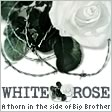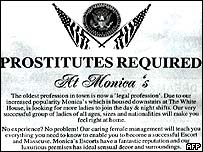[EU for Britain has] been more like getting mixed up with the mafia. First it’s an innocent poker game, then some girls show up, then you need to borrow some money, next thing you know a beefy fellow in a string t-shirt is giving your kneecaps a non-therapeutic massage, and you’re wondering, “Hey, I just wanted to play a little poker. Where did these concrete overshoes come from?”
– T. Hartin’s comment on a Samizdata post
|
|||||
|
Today’s news about the Home Secretary inexorably steamrolling his Big Blunkett ID card scheme fills me with gloom. It is the same sentiment that gripped me in April this year when the news of the revived ID card plans reached the headlines and made me set up White Rose, a protest blog collective. The blog has been up and running with the help of some notable bloggers who find the issues of civil liberty a hot topic in the Western world. However, a blog alone may not be enough. Civil disobedience may be the only way to oppose the damage being done. Such actions start from individuals. And we are all individuals here, right? For now, we have only the shining example of Mr Willcock. Let’s see what we can come up with…  Telegraph reports that David Blunkett, the Home Secretary, obtained political backing at a meeting of the Cabinet’s domestic affairs committee and a statement has been pencilled in for next Thursday, the last day of the current Commons session. Whitehall officials said final details had still to be agreed but no meeting of the full Cabinet is considered necessary to endorse what will be one of the most controversial decisions of Labour’s six years in power. The ID card will be required by everyone over 16 – more than 40 million people – and cost around £40, though with concessions for the elderly and the poor. Each card will contain biometric data, such as an image of a person’s iris or fingerprint, so police and other authorities can confirm the holder’s identity. So this is it then? Tagged, finger-printed, iris-scanned, data about us stored on a ‘central database’, at the mercy of government bureaucrats. I suppose the only thing left is the way of the late Mr Willcock who was the last person prosecuted in Britain for refusing to produce his wartime ID card and he spearheaded a public campaign that led to their abolition 50 years ago.
I am not sure this would work nowadays, after many years of Labour rampaging through the justice system. However, it may be worth a try… Stand have written a letter to Guardian regarding the news a Cabinet memo from Home Secretary leaked over the weekend about the introduction of an ID card scheme:
MPs are planning to introduce a new law specifically to allow them to remove a protester who has been living outside the House of Commons for more than two years. With all previous attempts to remove Mr Haw having failed – a High Court judge last year ruled that his protest was an expression of freedom of speech as defined by the European convention on human rights – the MPs are now recommending passing a special law which would ban protesters from permanently demonstrating outside Parliament without permission. The move has, however, been labelled “draconian” by civil rights groups. The Conservative party does not want Britain to leave the European Union. We want to make it work. Anyone who says differently is telling a lie. It is Friday evening and blogging about British politics and the Conservative Party was the last thing on my mind. However, this post appearing on Samizdata.net below cannot be left without a calm, measured and reasoned response it deserves. What the f***?! Conservatives?! Libertarian?! A viable alternative?! After checking the post for any undercurrents of sarcasm, I am still confused. This is due to the words Conservatives and libertarian appearing in the same context. The Tory party is a bunch of stale, narrow-minded and arrogant statists who believe that if everyone was a good chap…there, there…things would go just swimmingly and they would not have to try too hard and use their brains. Libertarianism is a dirty word to them, diversity means more illegal immigrants, freedom is predicated on the fact that everyone just comes round to their point of view and their confidence is based on arrogance. In case you missed it, I do not rate the Tory party highly. There is very little difference between them and the New Labour, apart from the latter being much better at public relations and spin. Philosophically, the Tories are as libertarian and exciting as a schoolmaster on valium. Their position on Europe is still confused, their views about taxation not very inspiring, what with NHS and education still being considered bottomless pits for taxpayers’ money, the BBC would be untouchable if it was not biased against them and individualism is something that does not happen to most people. Unfortunately, there is no such thing as fixed political competency, i.e. if one political party goes bad, the other improves. And so, as the Labour party is stumbling into a disaster of its own making, the Tories are certainly not meeting them on the way up. I do not know what the alternative to Labour is in the current political layout, but the Conservatives are certainly not it. And for all those concerned, Samizdata.net shall never be a slave to any adjectives. A newspaper advertisement headlined “Prostitutes Required” for a club “downstairs at The White House” has riled US officials in New Zealand. The crossed Stars and Stripes and bald eagle logo may appear to suggest the Bush administration has branched out, but the advert is in fact for a brothel in Auckland looking for new ladies for its nightclub, Monica’s.  The US Embassy has sent a letter to the business complaining that the advert, especially the logo, is in poor taste.
The brothel’s theme is unashamedly American and the building even has white columns outside similar to the US President’s residence. During the previous US administration the women working at the complex wore blue dresses like that of former White House intern Monica Lewinsky. The bordello’s owner Brian Legros was unrepentant.
Reuters reports:
Oh no, we are not imitating anybody!  The French and German ministers recently tasked with boosting bilateral cooperation have already agreed on one important point – the need for summer crash courses to learn each other’s language. French European Affairs Minister Noelle Lenoir and her German counterpart Hans-Martin Bury said each would spend part of their holidays in the other’s country sweating over grammar rules and vocabulary lists. They met to prepare an October conference bringing together the heads of France’s 22 regions and Germany’s 16 federal states to discuss boosting cooperation in education, culture, economic development and environmental issues. Lenoir told journalists in French after talks with Bury:
Heh. Jason and stuff has a brief but relevant pointer to the draft bill on Civil Contingencies:
Jason hopes that things will improve from the draft version, especially if we pester them… The Telegraph reports that Valery Giscard d’Estaing, the man in charge of drafting Europe’s first constitution, admitted yesterday that the much-trumpeted removal of the word “federal” from the text changed nothing and was merely a ruse to shield the British government from criticism. The former French president said the cosmetic change that did not affect the shape or character of the future EU or lessen the transfer of real power to Brussels.
So much for the British government’s insistence that the EU constitution will not lead to a European superstate. Downing Street has hailed the removal of the word federal as its biggest triumph in the 18-month long drafting process. Giscard d’Estaing also moaned:
The ‘patrician’ Frenchman is right about our desire to destroy Europe or at least the bit that insists on dragging Britain into it. Such efforts do appear to be if not counter-productive, certainly rather ineffective so far. However, if we could make him right about the influence on the British people…  |
|||||

All content on this website (including text, photographs, audio files, and any other original works), unless otherwise noted, is licensed under a Creative Commons License. |
|||||


